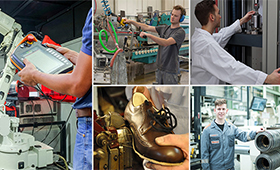Successful start for management assistants in e-commerce
BIBB publishes its 2018 ranking list for training occupations
10/2019 | Bonn, 13.03.2019

The training occupation of “management assistant in e-commerce” has got off to an impressive start indeed. Following its introduction on 1 August 2018, around 1,300 new training contracts had already been concluded by the end of the year. Male trainees accounted for 62% of new entrants, whereas the proportion of women was 38%. In the 2018 ranking list of newly concluded training contracts, management assistant in e-commerce has shot to 78th place in the most popular of the total of 326 recognised dual training occupations currently offered. “Office manager”, in which training occupation just under 28,000 new contracts were recorded in 2018, retained its top position in the rankings. It was followed by management assistant for retail services and vehicle mechatronics technician, each of which attracted around 23,000 trainees. These results have emerged from an individual evaluation at occupation level of the survey of newly concluded training contracts as of 30 September 2018 published by the Federal Institute for Vocational Education and Training (BIBB).
In 2018, over a third of all new training contracts were once more concluded in just ten occupations. There were just over 15,000 contracts in the occupation of information technology specialist. This represents a growth of almost 2,000 compared to the previous year, and the occupation has climbed two places to reach position number 7 in the Top 10. Figures for newly concluded contracts in this training occupation have been rising continuously. This shows the need of trade and industry for well-trained IT specialists against the background of the digitalisation of the world of work. Information technology specialist was yet again a training programme that was predominantly chosen by men. The proportion of women commencing training in the occupation is below 8 percent.
Office manager was again the favourite training occupation amongst women in 2018. As in the previous year, positions 2 and 3 were occupied by medical assistant and qualified dental employee. The proportion of new male trainees in these occupations remains at under 3 percent. Vehicle mechatronics technician led the way once more amongst the men, followed by electronics technician and information technology specialist.
In general terms, consideration needs to be given to the fact that the ranking list of newly concluded training contracts does not permit any conclusions to be drawn with regard to young people’s preferred training occupations. Training decisions always need to be viewed in conjunction with the existing supply of training places.
“We need to make it clear to young people that a whole range of dual training occupations is available,” stressed BIBB President Friedrich Hubert Esser. In his remarks, Professor Esser also addressed the forthcoming Girls’ and Boys’ Day. “Vocational orientation must draw attention to all the clichés that are associated with particular occupational roles. This can help us to make better use of the individual areas of potential boys and girls are able to offer. Young people should have the self-confidence to realise their own credo within their chosen occupation rather than aligning themselves to traditional role models.”
This is an area in which the “Cliché Free Initiative” (Initiative Klischeefrei) is seeking to make an impact. The project comprises an alliance of representatives from the fields of education, policy making, trade and industry and research and has set itself the task of removing the hackneyed gender element from the process of selecting an occupation or course of higher education study. The aim is that both boys and girls should consider the broad range of occupations on offer and pursue an option which suits their individual personality and life planning. The patron of the initiative is Elke Büdenbender, wife of the German President. The Cliché Free Initiative is supported by a service agency which is based at the Career Orientation Programme Office at the Federal Institute for Vocational Education and Training and at the Centre of Excellence for Technology, Diversity and Equality of Opportunity, a not-for-profit registered association.
Specimen copy requested if printed.